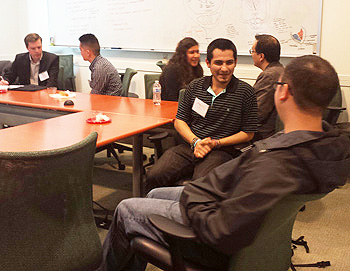Campus News
New program pairs alumni mentors with engineering undergraduates
Engineering students benefit from the experience and industry connections of alumni mentors.


Michael Riepe was part of the second class to graduate from the computer engineering program at UC Santa Cruz in 1991. The program was so young that few peers could provide advice, and Riepe’s only opportunity for mentorship was from an unfamiliar faculty advisor. Although he went on to a successful career–he earned a Ph.D. in electrical engineering at the University of Michigan in 1998 and now works for a hardware startup–Riepe said he could have used more guidance during his time at UCSC.
“Looking back, I think I could have benefited from some advice,” said Riepe, who now chairs the Baskin Alumni Advisory Council at UCSC’s Baskin School of Engineering.
Riepe said he realized that the work experiences of alumni could be a valuable source of advice and connections for current students and faculty. He had been thinking about establishing a program to connect current students with alumni mentors, and the idea finally gained traction when Melissa Liu, also a 1991 graduate of computer engineering, joined the advisory council.
Riepe and Liu connected with Lydia Zendejas, undergraduate advisor and director of a program that supports students and works to increase diversity in the Baskin School of Engineering. Together, Liu and Zendejas established a pilot mentorship program that will run through June. Feedback will inform a one-year program next year.
Women in engineering
Liu’s involvement began with her response to a survey the advisory council circulated among engineering alumni via the professional networking site LinkedIn. In the survey, Liu expressed interest in increasing diversity and the number of women in engineering. Liu said she remembers often being the only woman in her computer engineering classes. “And engineering as a whole really doesn’t look any different now,” she said.
After graduating from UCSC, Liu worked in the software industry, obtained a master’s degree in business administration, and worked as an independent consultant. Now she owns two companies: one for management consulting and another to develop software that helps children learn about engineering.
Nationally, women have obtained about 57 percent of all bachelor’s degrees awarded yearly since 2000, but they consistently represent about 20 percent of undergraduate engineering degrees, according to a report from the National Science Foundation. The report also shows how racial diversity among engineering undergraduates differs from the general population in the United States. Hispanic and African American students are underrepresented among engineering students, while white and Asian students are overrepresented.
The Multicultural Engineering Program (MEP) has worked to promote diversity in engineering at UCSC since 1999. Also known as the MESA Engineering Program, it receives support from a statewide program called Mathematics, Engineering, Science Achievement (MESA). MESA works with K-12 and higher education institutions to help educationally disadvantaged students obtain math-based degrees.
Students in the MESA Engineering Program at UCSC are typically the first in their families to graduate from college or enroll in a computer science program. They may have limited financial resources, or they could be part of a group historically underrepresented in engineering.
Industry mentors
As MEP program director, Zendejas said she was eager to incorporate more industry interactions into the program. Industry mentors enable students to stay connected to current practical knowledge, but it can be hard to find people willing to be mentors, Zendejas said. Working with the alumni council was a natural collaboration.
Liu recruited mentors from a list of alumni who had already expressed an interest in mentorship, and Zendejas invited 22 current MEP participants to join the alumni mentoring pilot project. Then they matched each student with a mentor based on the compatibility of their expressed interests, major, or career.
Most students met their mentors at a kickoff reception on February 22. Susan Feland, founder of a mentoring and professional development nonprofit for female military officers, presented advice to help the mentors and students build effective relationships. Mentors and their students, called protégés in this program, are expected to meet three times over the four months of the pilot program. Some of those meetings may happen virtually through email, video chats, or phone calls.
Both Liu and Riepe are serving as mentors. Liu’s protégé is a sophomore who wanted help getting positioned for summer internships and a job after graduation. Liu reviewed her resumé and helped her create a profile on LinkedIn. Mutual introductions have led to at least two job leads for her protégé, Liu said.
Riepe’s protégé, a double major in electrical engineering and bioengineering, is also a sophomore. Riepe helped him with choosing classes, and they discussed ways to find summer research opportunities on campus by talking with professors and students. “It takes courage to do that,” Riepe said.
Feedback from these first few months of mentorship will be used to inform a yearlong mentorship program next year, Liu said. “It’s very exciting to mentor the types of students that we want to see in engineering,” she said, adding that she hopes each class can inspire and recruit the next generation of diverse students. “That can add up to some pretty big impacts.”